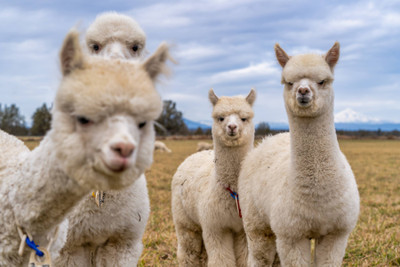Why Is Alpaca Fiber So Sustainable?
Alpaca by Design on Sep 14th 2023
The world of sustainable fashion and textiles is abuzz with discussions about environmentally friendly alternatives. Among these alternatives, alpaca fiber has emerged as a strong contender, often overshadowing traditional sheep's wool. In this blog post, we'll explore why alpaca fiber is gaining recognition as a more sustainable choice when compared to sheep's wool.
Efficient Grazers and Minimal Land Impact
One of the primary reasons alpacas are considered more sustainable than sheep lies in their grazing habits. Alpacas are efficient and selective grazers, which means they consume only the parts of plants they need, leaving the rest intact. In contrast, sheep are more indiscriminate grazers, often causing overgrazing and soil degradation.
The careful eating habits of alpacas help maintain the health and biodiversity of the pastures they inhabit. They prevent the soil from eroding and contribute to the overall preservation of the landscape. This minimal land impact is in stark contrast to the negative environmental consequences associated with overgrazing by sheep.
Lower Water Usage
Another significant advantage of alpaca farming in terms of sustainability is its lower water consumption. Unlike sheep, which often require extensive irrigation and water-intensive pastures, alpacas are adapted to arid environments and have evolved to make the most of available water resources. This reduced demand for water aligns with sustainable agricultural practices and conserves precious freshwater reserves.
Reduced Methane Emissions
Methane emissions from livestock are a significant contributor to greenhouse gases and climate change. Sheep, particularly those raised in industrial-scale farming operations, produce considerable amounts of methane due to their digestive systems. Alpacas, on the other hand, have a more efficient digestive process that produces fewer methane emissions. This means that alpaca farming has a lower carbon footprint and contributes less to global warming compared to sheep farming.
Exceptional Fiber Quality
Alpaca fiber is known for its exceptional quality, often surpassing traditional sheep's wool in terms of softness, warmth, and durability. This high-quality fiber has several sustainability implications. Firstly, it tends to last longer in products, reducing the need for frequent replacements and lowering overall consumption. Additionally, the quality of alpaca fiber makes it a valuable and desirable material, encouraging responsible and ethical farming practices.
Limited Use of Chemicals and Pesticides
Sheep farming, particularly in the conventional wool industry, often involves the use of pesticides and chemicals to treat and protect the sheep from various diseases and parasites. These chemicals can have harmful effects on the environment and contribute to soil and water pollution. Alpaca farming, by contrast, generally relies less on such chemicals due to the natural resilience of alpacas to many common livestock ailments.
Less Energy-Intensive Farming Practices
Alpacas are hardy animals that require less intensive farming practices compared to sheep. Sheep farming often involves energy-intensive activities such as shearing, drenching, and feeding. Alpacas, in contrast, require minimal intervention and are more self-sufficient when it comes to their daily needs. This results in lower energy consumption and contributes to a more sustainable farming process.
Ethical Animal Treatment
Sustainability extends beyond the environment; it also encompasses ethical considerations. Alpaca farming is often associated with more humane and ethical practices, with a focus on providing proper care and spacious, natural environments for the animals. This not only ensures the well-being of the alpacas but also contributes to the sustainability of the industry by fostering healthy and content animals.
Supporting Traditional Communities
Alpaca farming is deeply rooted in the traditions of indigenous communities in South America, where the majority of alpacas are raised. By choosing alpaca fiber, consumers can support these local communities and help preserve their traditional way of life. This economic sustainability not only benefits the people but also ensures the continued existence of sustainable alpaca farming practices.
In conclusion, the comparison between alpaca and sheep fiber reveals several reasons why alpaca is considered more sustainable. Alpacas' efficient grazing habits, lower water usage, reduced methane emissions, exceptional fiber quality, limited chemical usage, less energy-intensive farming practices, ethical treatment of animals, and support for traditional communities all contribute to its sustainability. As consumers increasingly prioritize eco-conscious choices, alpaca fiber emerges as a natural and sustainable alternative that not only benefits the environment but also supports responsible and ethical farming practices.

